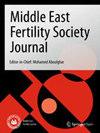Characterization of seminal microbiome associated with semen parameters using next-generation sequencing
IF 1.3
Q4 REPRODUCTIVE BIOLOGY
引用次数: 0
Abstract
To characterize the seminal microbiome associated with normal and abnormal semen parameters, towards the prediction of reproductive health and sperm quality. Despite the association between bacteria and infertility, few studies have looked at the beneficial effects of the seminal microbiome on infertility. The study comprised semen samples from 69 men with normal spermiograms and 166 men with at least 1 abnormal spermiogram parameter from the Institutional IVF Center between October 2019 and October 2022. We hypothesized that the composition of the microbiota may affect semen parameters. To determine the composition of uncultured bacteria, the 16S ribosomal RNA (rRNA) gene was amplified using Oxford Nanopore Technology. Different groups of bacteria were present in the semen samples of patients with normal semen parameters, such as female factor infertility and abnormal sperm parameters. Bacterial communities differed between samples. However, the relative distribution of Lactobacillus and Prevotella in the normal and abnormal semen groups differed (p = 0.05) and was statistically significant. In the abnormal semen group, the incidence of Lactobacillus probiotics was lower and the frequency of Prevotella was higher. Additionally, principal component analysis (PCA) revealed differences in the microbial composition of normal and abnormal semen. In our study, NGS analysis revealed the increased presence of harmful bacteria Prevotella in groups with abnormal semen raises the possibility that certain microbiota may be associated with semen quality and male infertility.利用新一代测序技术确定与精液参数相关的精液微生物群特征
确定与正常和异常精液参数相关的精液微生物组的特征,从而预测生殖健康和精子质量。尽管细菌与不育症之间存在关联,但很少有研究探讨精液微生物群对不育症的有益影响。该研究包括2019年10月至2022年10月期间,来自机构试管婴儿中心的69名精子图正常男性和166名精子图参数至少有一项异常的男性的精液样本。我们假设微生物群的组成可能会影响精液参数。为了确定未培养细菌的组成,我们使用牛津纳米孔技术扩增了 16S 核糖体 RNA(rRNA)基因。精液参数正常、女性因素不孕和精子参数异常患者的精液样本中存在不同的细菌群。不同样本的细菌群落各不相同。然而,乳酸杆菌和普雷沃茨菌在正常精液组和异常精液组中的相对分布存在差异(p = 0.05),并具有统计学意义。在异常精液组中,乳酸杆菌益生菌的发生率较低,而普雷沃茨菌的频率较高。此外,主成分分析(PCA)显示正常精液和异常精液的微生物组成存在差异。在我们的研究中,NGS 分析显示精液异常组中有害细菌普雷沃茨菌的存在增加,这就提出了某些微生物群可能与精液质量和男性不育有关的可能性。
本文章由计算机程序翻译,如有差异,请以英文原文为准。
求助全文
约1分钟内获得全文
求助全文
来源期刊

Middle East Fertility Society Journal
REPRODUCTIVE BIOLOGY-
CiteScore
2.80
自引率
0.00%
发文量
32
审稿时长
45 weeks
 求助内容:
求助内容: 应助结果提醒方式:
应助结果提醒方式:


